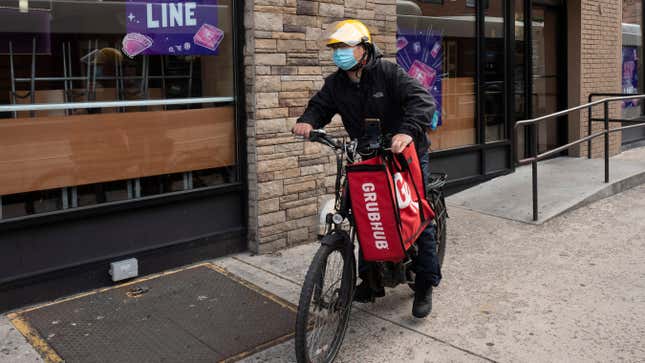
Delivery workers, accustomed to schlepping burrito bowls past armed robbers for table scraps, were granted some basic rights on Thursday by New York’s city council. In a nearly unanimous vote, they passed a suite of bills that will allow basic rights like bathroom access and minimum pay. Based on remarks made to THE CITY on Wednesday, Mayor Bill DeBlasio seems likely to sign the bills into law. It’s the first legislation to set delivery industry standards in a major U.S. city.
The measure feels long overdue, three years after New York City passed the first wage floor for rideshare drivers, which various cities later followed. Earlier this month, City Council voted to make app commission caps of 20% permanent, after allegations that apps were eating up to 40% of restaurants’ delivery earnings. (DoorDash, UberEats, and Grubhub are suing the city, complaining that the caps cost them money.)
The set of six bills now force restaurants to let workers use the bathrooms; force apps to disclose tip disbursements to workers and customers; force the apps to provide insulated bags; allow workers to set maximum trip distance; direct a study to determine minimum payments; and prevent apps from charging them fees for payment.
The effort was spearheaded by the activist group Los Deliveristas Unidos, a mostly immigrant activist collective of app delivery workers. Pointing out that delivery workers often ride up to 12 hours in bad weather for less than a living wage, the organization has been pushing for bathroom access, fair pay, safety protections, public space for rest breaks, and the right to organize.
Restaurant restroom access, which would take effect as soon as the bill passes into law, grants delivery workers the human right not to be forced to urinate on the street. The issue has attracted New York’s classist demons: In April, when an Upper West Side community board member brought up the idea of mandating that restaurants open their bathrooms, one of a handful of hostile Manhattanites called the concept “horrifying.”
Unfortunately, base wage would take a while to arrive. The base pay bill doesn’t set a number, but instead requires the Department of Consumer and Worker Protection to study and determine the best way to even calculate minimum payment, with a January 2023 deadline.
In 2019, a New York Times report revealed that DoorDash had stolen tips by deducting the amount from their trip pay. DoorDash changed its tipping model shortly after but still denied allegations of tip theft in 2020 when it settled a suit filed by the Washington, DC, attorney general for $2.5 million.
Setting maximum trip distance would also help delivery workers earn a living wage; last year, THE CITY reported that workers might ride up to 70 blocks in one trip. The bill will further allow workers to select bridges and tunnels they refuse to cross, which would allow workers to avoid gauntlets of thieves.
In a press conference today, New York City Councilmember Carlina Rivera said that it “took very, very tragic moments” to arrive at this legislative package. At least nine people have been killed on the job in 2021, most by drivers.
Delivery workers find pay rates across the various apps perplexing, according to a report released earlier this month and co-authored by several groups including Los Deliveristas Unidos and the Worker Institute at Cornell. It notes that apps have no fixed rates, and that “the amount the apps pay per mile, minute, and other factors change from day to day.” Apps also don’t count wait times as on-the-clock time (an issue shared by rideshare drivers). That means, the report explains, that the apps might claim workers made double or triple their actual pay per hour:
“[I]f a delivery worker had scheduled a 10 hour shift with an app, but did not receive many orders, he/she may only have made $70,” it reads. “The worker would report, ‘I only made $7/hour today.’ The app, on the other hand (ignoring the time the worker was actively waiting for an order) would say that the worker was on the clock only for 3.5 hours and therefore made $20/hour.”
The report found that before tips, workers make $7.87 per hour, half the city’s minimum wage. In an email to Gizmodo, DoorDash said that its workers nationally make $25 per hour and work less than four hours per week. A spokesperson did not answer our request to explain how the company calculates that figure.
The report also found that New York delivery drivers are disproportionately immigrants who chose the apps due to covid-19 job loss or a lack of options. Out of 500 app-based delivery workers surveyed, respondents were primarily Latinx, 40% support family members, and over 60 percent worked six or seven days a week.
DoorDash left its stance on the bills open for interpretation. “We will continue to work with all stakeholders, including the City Council, to identify ways to support all delivery workers in New York City without unintended consequences,” a spokesperson said via email. The company complained that the bathroom access bill was changed without DoorDash’s input so that the bathroom access would be guaranteed through a contract between DoorDash and restaurants. They said that DoorDash already shows trip distance before a Dasher selects the order. They also claimed that Dashers might discriminate against low-income communities if they can set work by geography.
Grubhub sounded more enthusiastic. In an email to Gizmodo, the company called the bills “common sense steps.”
“Ensuring [delivery workers] receive a living wage and have access to restrooms isn’t just a good idea - it’s the right thing to do,” a company spokesperson said.
The bills require either a mayoral signature or they’ll lapse into law after 30 days.